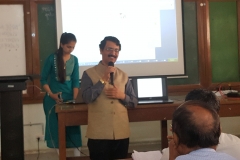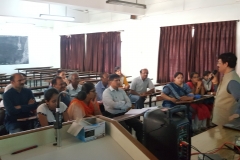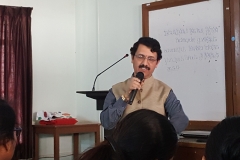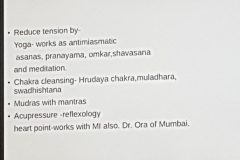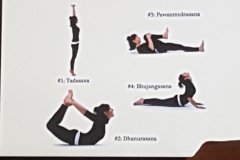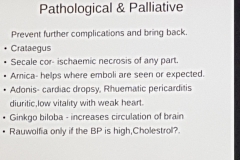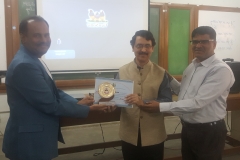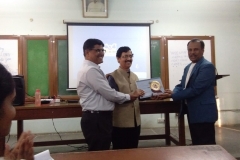The 2nd CME of the year 2019, organised by KQHDA was held on 3rd February 2019 at RV Teachers college Jayanagar at 3pm. The president of KQHDA, Dr Chaithali Kulkarni welcomed the audience, followed by introduction of the speaker by Dr Srinivas.
Speaker of the day Dr Manjunath M.D (Hom) is currently the RMO of Government homoeopathic medical college. He has 31 years of clinical experience and has been treating more than 7 lakh patients till date.
Dr Manjunath spoke about the topic “CORONARY ARTERY DISEASE”. The speaker simplified the topic and infused confidence among the young practitioners in handling cardiac cases. He threw light on how to avoid surgical intervention and instead go for reversal of blockage through various measures.
Having a strong hold on anatomy and pathology of the disease the homoeopathic physician should first discriminate the case.
- As an emergency or a non-emergency
- Elicit the cause (mental or physical) through case-taking
- Treatment should be based on symptom totality, constituition and miasmatic phase of the patient.
- Type of homeopathic treatment is classical, pathological or palliative depending upon the symptoms ascertained.
Some of the common remedies listed were Lach, Naja, Ignatia, Nat mur, Staph, Acon.
Palliative medicines- Crataegus, Secale cor(necrosis in any part), Arnica(emboli), Adonis(as cardiac drops and in rheumtic pericarditis), Rauwolfia if blood pressure is high and Gingko biloba.
Cholesterol controlling remedies – Lapis alb, Cholestirinum, Guatteria gaumeria, Cephalandra, Eel serum, Uranium nit.
He also emphasised the use of FIP method of Dr SCHROYENS, where F stands for frequency, I for intensity and P for peculiar in analysing symptoms.
Management includes change of lifestyle, reducing quantity of food, eating more of greens, walking regularly, DM and HTN control, quitting alcohol and smoking, regular yoga (which acts as antimiasmatic), Chakra cleansing, Mudras, Mantras and Acupressure along with Homoeopathic treatment. The speaker also told us that drinking pomegranate juice daily acts as a blood thinner.
At the end of the session we carried a sense of aspiration to treat more and more cardiac cases with confidence and assurance homoeopathically.
Finally, the vote of thanks was given by Dr Chaitali and the memento was handed over by Dr Swamy and Dr Sreenivasulu to Dr Manjunath.
Reported by
Dr Shashi, BHMS

